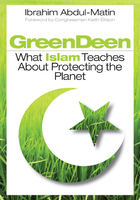
第3章 Foreword
KEITH ELLISON
U.S. Congressman,
Minnesota Fifth Congressional District
The seeds of this book were sown at a meeting of the 2008 Congressional Black Caucus in Washington, DC. Congressman André Carson and I had convened a session focusing on Muslim American communities and their development of a civic identity and expanding social activism. A young Green For All fellow, Ibrahim Abdul-Matin, was in the audience, and he convinced me to put on a green hard hat and have my picture taken with a poster saying “We're Ready for Green Jobs Now!” It was part of a national campaign with the goal of solving two of the greatest problems of this generation: joblessness and the assault on the environment. Ibrahim made an important connection that day—that the faith community needs to be involved in the green movement.
Solving problems is about making the right connections. I remember making the connection between the excessive number of asthma cases in my community and the coal-fired power plant a few blocks away. But it wasn't until I ran for the Minnesota state legislature for the first time that it really clicked for me.
I was standing outside a local elementary school in 2002, talking with a public health nurse who told me that we had a chance to convert that coal-fired power plant to natural gas. She hastened to add that the natural gas–fired plant would still involve the use of a fossil fuel, but that high-efficiency natural gas–fired power stations can produce up to 70 percent fewer greenhouse gas emissions than existing coal-fired generators.
On the spot, we agreed to pull together a community meeting in the basement of a local Urban League building. To my surprise, a lot of people really wanted to help. I thought that most neighbors, many of whom were low- to moderate-income folks, would be more focused on job creation and public safety. But these folks saw a clean environment as key to their health, well-being, and safety.
People wanted a cleaner environment, and they wanted jobs connected to the cleaner environment. We agreed that we needed a vehicle, an organization to channel our efforts around the coal-to-gas conversion. We called ourselves the Environmental Justice Advocates of Minnesota (EJAM). We didn't have any experts, but we had a lot of folks with heart and passion.
EJAM invited the Public Utilities Commission, the agency charged with approving the coal-to-gas conversion, to hold a hearing in the same Urban League building where we'd held our first meeting. Two hundred and fifty people came. One older man walked up to the microphone, hoisted a string of fish into the air, and lamented the loss of edible fish because of the mercury contamination caused by the coal plant. The public health nurse who talked me into organizing around the coal plant conversion brought in a banker's box full of asthma inhalers. She said they were from the kids at the elementary school. By time the hearing ended, folks had expressed their views about a cleaner environment. These people were not the usual suspects—the lawyers, the scientists, the industry types. They were “We the People”—kids and seniors, African Americans and whites, Hmong and Somali, Latino and more. They were Muslims, Christians and Jews, Hindus and others. All were joined together with the simple idea that all people should have the right to drink clean water, breathe clean air, and help make the rules that govern our environment.
The Public Utilities Commission (PUC) decided to move ahead and approve the coal-to-gas conversion, and PUC leaders pointed to our public hearing as one of the main turning points in that struggle. As a result, kids and adults today in Minneapolis can breathe easier, and grandfathers might one day be able to eat the fish they catch with their grandkids.
EJAM helped make the connections between hardworking people and environmental justice. An EJAM organizer, Karen Monahan, made the connection between me and Ibrahim—a young Muslim politico who was writing about Islam and the environment. Soon I realized that Ibrahim was the guy I'd met at the 2008 caucus who'd taken the photo of me in the green hard hat. Like the work we have done through EJAM, Green Deen brings faith communities into the environmental movement by changing the conversation from the facts of global warming to the fact that we all live and work here together and have a collective responsibility to keep this place clean and safe for everyone.
Ibrahim is a man of faith, as many Americans are. In Green Deen, he talks to the same people who started EJAM—Muslims, Christians, Jews, Hindus, Buddhists, environmentalists, and many others who all see the value in the simple ideas that drove us to create a coalition in my home state of Minnesota. We learned that environmental advocacy is not only the prerogative of the experts, politicians, and the industry executives. Ordinary citizens can impact environmental policy, and Ibrahim reminds people of faith that their impact is important and very much needed.
We the people can and must shape environmental policy. We can make the connections.
Bismillah ar-Rahman ar-Rahim—
In the Name of Allah, the Most Beneficent, Most Merciful